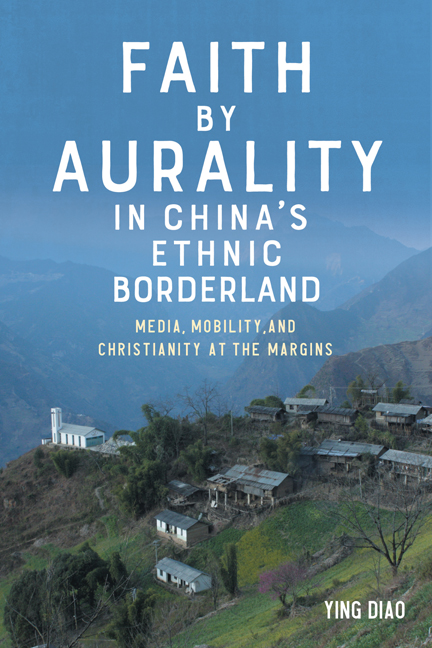Book contents
- Frontmatter
- Dedication
- Contents
- Acknowledgments
- Notes on Romanization and Terminology
- Introduction
- 1 Becoming the Faithful: Cleanliness and Conversion
- 2 Hearing the Return of Faith: Radio and Listening Audience
- 3 Producing Gospel Songs: Studio and Media Practitioners
- 4 Faces and Places: Sounds That Recognize
- 5 Traces of Faith: Sound Artifacts and Infrastructures
- 6 Performing Recorded Songs: Religiosity by Body
- 7 Hidden Faith: Sanitizing the Voice
- Conclusion: Faith on the New Frontier
- Appendix 1 Glossary of Old Lisu
- Appendix 2 Glossary of Chinese Characters
- References
- Index
7 - Hidden Faith: Sanitizing the Voice
Published online by Cambridge University Press: 15 May 2024
- Frontmatter
- Dedication
- Contents
- Acknowledgments
- Notes on Romanization and Terminology
- Introduction
- 1 Becoming the Faithful: Cleanliness and Conversion
- 2 Hearing the Return of Faith: Radio and Listening Audience
- 3 Producing Gospel Songs: Studio and Media Practitioners
- 4 Faces and Places: Sounds That Recognize
- 5 Traces of Faith: Sound Artifacts and Infrastructures
- 6 Performing Recorded Songs: Religiosity by Body
- 7 Hidden Faith: Sanitizing the Voice
- Conclusion: Faith on the New Frontier
- Appendix 1 Glossary of Old Lisu
- Appendix 2 Glossary of Chinese Characters
- References
- Index
Summary
The Nujiang Lisu folk choir [minjian hechangtuan] is from remote mountainous areas of Yunnan. It is hard to believe that this harmonious and beautiful music was sung by a group of authentic [didao] peasants who had never been to the provincial capital before. The choir is made up of thirty peasants from Fugong, Gongshan, and Lanping of Nujiang. The oldest member is sixty and the youngest is just sixteen.
—Yunnan Ribao [Yunnan Daily], October 6, 1996We would never mention Christians in our promotion—the introduction must have been written by the staff working in the Nationalities Village. When we propagate the peasant choir, we try to avoid using any church-related terms. We only need to promote it to be a Lisu cultural heritage rather than to make our promotion like a publicity of religion.
—Zhao Yunsheng, interview with the author, June 21, 2013When I took my first field trip to Nujiang in 2010, there were not many tourists there, partly because the transportation to the area was so inconvenient. At the time, it took more than ten hours to travel by bus from the provincial capital Kunming to the prefectural seat Liuku. When traveling in Nujiang via the riverside road or mountain trails that then were the only means of passage through the area, adventurous first-time visitors might, if coming at an appropriate time, have encountered a village Sunday service or a Christmas celebration. The greatest impression they might have gained would have been of resounding multipart hymn singing in a language they did not understand. This long vocal tradition of the local faith community, introduced by Western Christian missionaries in the early twentieth century, did not achieve wider attention outside Nujiang until the creation in 1996 of the Lisu peasant choir (nongmin hechangtuan), which features musically untrained “peasants” of mostly Lisu ethnicity singing Lisu-language choral works. The peasant choir performed on a wide range of occasions throughout the 2000s. The official narrative not only promoted its status as an integral part of Lisu heritage, representative of Nujiang's ethnic and cultural diversity; it also reoriented the choir members’ capacities of choral part singing from their “hidden” Christian life to their “visible” ethnicity: they are Lisu, and therefore, they are skilled singers of Lisu multipart folk songs (duoshengbu minge), which were announced by the state council as part of the national intangible cultural heritage in 2006.
- Type
- Chapter
- Information
- Faith by Aurality in China's Ethnic BorderlandMedia, Mobility, and Christianity at the Margins, pp. 167 - 192Publisher: Boydell & BrewerPrint publication year: 2023



